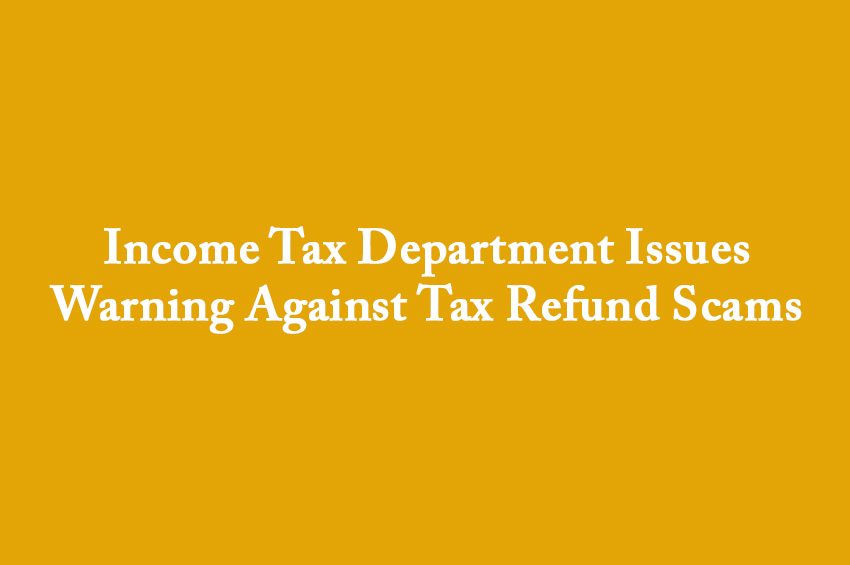Winning Bizness Desk
Mumbai. The Income Tax Department has issued a stern warning to taxpayers regarding fraudulent messages that claim to offer tax refunds. As many taxpayers eagerly await their income tax refunds after filing their returns, the department has alerted them to be vigilant against fake messages circulating on mobile phones. These messages, often promising tax refund approvals, are part of a scam designed to deceive unsuspecting taxpayers.
Beware of Fake Pop-Up Messages
In a recent post on social media platform X (formerly Twitter), the Income Tax Department cautioned taxpayers not to fall prey to fake pop-up messages. The department emphasized that it never contacts taxpayers through pop-up windows, marking these communications as a scam alert. Taxpayers have been advised to be wary of any suspicious pop-up messages appearing on their mobile devices and to turn them off immediately if encountered.
To protect against potential fraud, the department has provided a channel for reporting such scams. Taxpayers who receive these fake messages are encouraged to file a complaint by visiting the official Income Tax website at [http://incometaxindia.gov.in/pages/report-phishing.aspx](http://incometaxindia.gov.in/pages/report-phishing.aspx). Additionally, the department has issued helpline numbers—18001030025 and 18004190025—where taxpayers can register complaints and seek assistance.
The Nature of the Scam
The Income Tax Department has received numerous complaints about these deceptive messages. Typically, these messages promise approval of a tax refund, often specifying an amount, such as ₹15,000, that is allegedly set to be credited to the recipient's account. The message may also include an account number for verification, with instructions to click on a link to update bank account details if the number is incorrect. However, this seemingly harmless request is a trap. Once the recipient clicks on the provided link, cybercriminals can gain access to their phone and potentially steal all the money from their bank account. This fraudulent activity has led to significant financial losses for victims who were lured by the promise of a tax refund.
Official Advice from the Income Tax Department
Given the rise in such scams, the Income Tax Department has urged taxpayers to exercise caution and not to click on any links provided in these fraudulent messages. The department reiterated that it does not communicate with taxpayers through pop-up messages or unsolicited links. Taxpayers are advised to rely only on official communications from the department, typically sent via registered email or SMS from verified sources.
How to report cyber fraud?
To report scams, including fraudulent messages, here are the general steps you can take:
1) Income Tax Department (for Tax-Related Scams)
Report Online: Visit the official Income Tax Department’s website at Report Phishing. Follow the instructions to submit details about the scam.
Helpline Numbers: Call the Income Tax Department’s helpline numbers at 18001030025 or 18004190025 to report the scam and seek further assistance.
Email: If you receive a phishing email related to income tax, you can forward it to the Income Tax Department at phishing@incometaxindia.gov.in.
2) Cyber Crime Reporting
National Cyber Crime Reporting Portal: For other types of scams, especially those involving cyber fraud, you can report them at the National Cyber Crime Reporting Portal. This portal is managed by the Government of India.
Local Police: You can also report cyber scams to your local police station. Many police departments now have specialized cybercrime units that handle such cases.
3) Bank Reporting (if financial information was compromised)
Contact Your Bank: If you have provided any financial information, such as your bank account or credit card details, immediately contact your bank to freeze the account and prevent unauthorized transactions.
File a Dispute: If fraudulent transactions have occurred, file a dispute with your bank to recover the lost money.
4) Consumer Helplines
National Consumer Helpline: You can also report scams to the National Consumer Helpline or call 1800-11-4000. They can guide you on how to take further action and protect your rights as a consumer.
5) Report to Email Providers
If you receive scam emails, report them to your email provider. Most email services like Gmail, Yahoo, and Outlook have options to mark emails as phishing or spam.
6) Stay Informed
Educate Yourself: Stay informed about the latest scams by following news and updates from reliable sources, such as government websites and cybersecurity experts.
Share Information: Spread awareness among your friends and family to prevent them from falling victim to similar scams.
By taking these steps, you can help prevent scams and protect yourself and others from financial and personal information theft.


